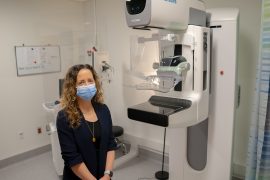May 2, 2024
Listening to music benefits older adults’ cognitive health, even if it’s music they haven’t heard before or don’t enjoy very much, according to a study by Simon Fraser University and Health Research BC researchers.
Led by SFU neuroscientist Sarah Faber, the study published in Network Neuroscience discovered that listening to music activates brain regions linked to reward in older adults, regardless of their familiarity with the music.
“Hearing music engages multiple networks across our brains,” says Faber. “On top of the physical properties of sounds we hear, several additional factors help form the whole-brain picture. Have you heard the song before? Do you like it? Does it bring back memories?”
Faber, who is also a postdoctoral researcher with SFU’s Institute for Neuroscience and Neurotechnology, says that hearing music may be beneficial for older adults with neurodegeneration such as Alzheimer’s Disease as it can help bring back memories and provides a way to stay connected to their past and to their loved ones, as well as their peers.
Researchers monitored brain activity across two cohorts of participants listening to music: a younger group of adults with an average age of 19, and a set of older adults with average age of 67.
Participants listened to 24 samples, including songs they selected themselves, popular and recognizable music intentionally chosen by researchers and ambiguous songs composed specifically for the study.
“We found that the brain structures responsible for processing physiological and cognitive reward – also known as the reward network – are activated in younger adults while they listen to music they like or are familiar with. However, older adults’ reward networks are stimulated by music even when it is brand new to them, or if they report not liking it very much,” says Faber.
“Understanding how music works in the brain is highly complex, especially given that our brains are constantly evolving with age,” she says. “With training, the auditory reward network can become even more engaged across all types of music.”
“But even when the music is not familiar to them, it still has the ability to make their body move, and to help calibrate or balance their emotions by activating those regions in the brain,” she says.
Faber says there are several additional benefits of listening to music for both older and younger adults. “If you’re going through a tough time, music can motivate you or help you relax. It can help us form social bonds.
“Bonding with a person over shared music that you like is a highly effective way to connect. We can also bond with people over shared music that we dislike.”
Having laid down the groundwork for her future research, Faber’s next steps include applying the methods and the conclusions from this study to examine whether the same patterns of brain activity are found in older adults with dementia and Alzheimer’s disease.
Faber’s research is funded by Michael Smith Health Research BC (Health Research BC) and the Alzheimer’s Society of British Columbia.






